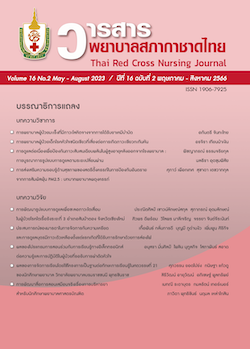Care Model Development for Slowing the Disease Progression of Patients with Third-Stage Chronic Kidney Disease in San Pa Tong District, Chiang Mai Province
Keywords:
slow progression of CKD, Chronic Kidney Disease stage 3, model developingAbstract
This action research aimed to develop a care model to slow the progression of disease in patients with the third-stage chronic kidney disease (CKD) in San Pa Tong District, Chiang Mai Province. From December 2020 to September 2021, the research process consisted of two stages: 1) The first stage involved analyzing the current care situation and developing a care model based on group discussion with 15 patients with third-stage CKD and group meetings with 8 multidisciplinary teams over 3 months. 2) The second stage involved testing and improving the model with 10 third-stage CKD patients over 4 months. The research instruments consisted of: 1) group discussion guidelines, 2) a case management assessment form, 3) consultation guidelines to support self-management, 4) demographic and disease control forms, and 5) an instrument measuring sodium consumption in food. Qualitative data were analyzed by content analysis, while quantitative data were analyzed using frequency, percentage, mean, standard deviation, and Wilcoxon signed-rank test. The results from the care situation analysis revealed that: 1) there was no specific outpatient department for patients with the third-stage CKD, and care outcomes were lower than the standard goal; 2) there was limited access to the services, inadequate health education provision by nurses, and no sufficient surveillance for patients with the third-stage CKD; 3) the food consumption behavior of patients mostly included local foods with high sodium. The care model developed to slow the progression of CKD Patients is comprised of: 1) screening, 2) case management, 3) care provision, 4) support for self-management, 5) monitoring and empowerment, and 6) outcome evaluation. The results from testing the model over 4 months showed that the mean eGFR before and after testing was 47 and 51 ml/min/1.73 m2/yr, respectively, but it was not statistically significant (Z = 1.129, p-value =. 259). However, 33.33% of patients experienced improved CKD stages, and 66.67% remained at the same stage.
The study reflected that the care model to slow the progression of third-stage CKD requires collaboration between the multidisciplinary team and patients, and the involvement of patients in the self-management of reducing sodium shows an advantage in slowing the progression of CKD. Future research should test the model with a comparative group and a larger sample size.
References
International Society of Nephrology. ISN-Global kidney health atlas [Internet]. 2019 [cited 2022 Sep 1]. Available from: www.theisn.org/global-atlas.
Aekplakorn W, Chariyalertsak S, Kessomboon P, Assanangkornchai S, Taneepanichskul S, Neelapaichit N, et al. Women and other risk factors for chronic kidney disease of unknown etiology in Thailand: national health examination v survey. Sci Rep 2021;11:22674. doi: 10.1038/s41598-021-02191-5.
Wijitsoonthornkul K. Epidemiology and review of preventive intervention of chronic kidney disease [Internet]. Division of Non Communicable Diseases; 2022 [cited 2022 Sep 1]. Available from: http://thaincd.com/2016/media-detail.php?id=14423&gid=1-015-005.
GBD Chronic Kidney Disease Collaboration. Global, regional, and national burden of chronic kidney disease, 1990-2017: a systematic analysis for the global burden of disease study 2017. Lancet 2020;395(10225):709-33. doi: 10.1016/S0140-6736(20)30045-3.
Kurathong S. Chronic kidney disease. In: Internal medicine. Bangkok: P. A Living; 2018. p. 99-123. (in Thai)
Nerbass FB, Calice-Silva V, Pecoits-Filho R. Sodium intake and blood pressure in patients with chronic kidney disease: a salty relationship. Blood Purif 2018;45(1-3):166-72. doi: 10.1159/000485154.
Borrelli S, Provenzano M, Gagliardi I, Michael A, Liberti ME, Nicola LD, et al. Sodium intake and chronic kidney disease. Int J Mol Sci 2020;21(13):4744. doi: 10.3390/ijms21134744.
Department of Disease Control, Ministry of Public Health. Manual of practice for prevention of chronic kidney disease in patients with diabetes or hypertension. Bangkok: Printing Office of The War Veterans Organization of Thailand Under Royal Patronage of His Majesty the King; 2016. (in Thai).
Sarnthong P. The development model of diabetes and hypertension for to slow down the integrated kidney disease Renu Nakhon Hospital, Renu Nakhon district, Nakhon Phanom province. Mahasarakham Hospital Journal 2018;15(3):76-84. (in Thai)
Phaengkha W. Effectiveness of care for patients with diabetes mellitus and chronic kidney disease stage 2-4 with case management at Nam Nao Hospital Health networks, Phetchabun Province. Region 11 Medical Journal 2017;31(3):405-14. (in Thai)
Reaungboon A, Padee P, Pradittapong J, Riengisarang Y, Konsue A. A model for promotion and rehabilitation of glomerular filtration rate in patients with chronic renal disease. Journal of Health Science 2019;28(Suppl 2):S122-9. (in Thai)
Chowpontong S. Multidisciplinary pre-dialysis care in Phra Nakhon Si Ayutthaya Hospital. Journal of Preventive Medicine Association of Thailand 2015;5(3):197-206. (in Thai)
Seephom S, Prapaipanich W, Janepanich P, Pichaiwong W. The effect of self-management program for slow chronic kidney disease progression on knowledge, health behavior and blood pressure levels. Thai Journal of Cardio-Thoracic Nursing 2014;25(1):16-31. (in Thai)
Chiang Mai Public Health Office. Health data center [Internet]. (n.d). [cited 2022 Sep 1]. Available from: https://cmi.hdc.moph.go.th/hdc/reports/page.php?cat_id=e71a73a77b1474e63b71bccf727009ce. (in Thai)
Chailimpamontree W, Kantachuvesiri S, Aekplakorn W, Lappichetpaiboon R, Sripaiboonkij Thokanit N, Vathesatogkit P, et al. Estimated dietary sodium intake in Thailand: a nation-wide population survey with 24-hour urine collections. J Clin Hypertens 2021;23(4):744-54.
Kemmis S, McTaggart R. The action research planner. 3rd ed. Victoria: Deakin University; 1988.
Chinnawong T. Case management for clients with diabetes mellitus and hypertension in a community. Songklanagarind Journal of Nursing 2017;37(1):148-57. (in Thai)
Glasglow RE. 5 A’s Behavior change model adapted for self-management support improvement [Internet]. 2022. [cited 2022 Sep 1]. Available from: https://www.uspreventiveservicestaskforce.org/home/getfilebytoken/vGpPzqpTfEzP42Woby59Ds.
Kantachuvesiri S. Salt meter [Internet]. 2022 [cited 2022 Sep 1]. Available from: https://www.youtube.com/watch?v=_Wz9ckoktLM). (in Thai)
Panpeankunpak P. The effect of food control program for chronic kidney disease patients at CKD clinic, Phra Nakhon Si Ayutthaya Hospital. Journal of Preventive Medicine Association of Thailand 2016;6(3):205-15. (in Thai)
Downloads
Published
Issue
Section
License
Copyright (c) 2023 Srisavarindhira Thai Red Cross Institute of Nursing

This work is licensed under a Creative Commons Attribution-NonCommercial-NoDerivatives 4.0 International License.
เนื้อหาบทความหรือข้อคิดเห็นต่างๆ ในวารสารพยาบาลสภากาชาดไทยนี้ เป็นความคิดเห็นของผู้เขียนบทความ ไม่ใช่ความเห็นของกองบรรณาธิการ หรือสถาบันการพยาบาลศรีสวรินทิรา สภากาชาดไทย






